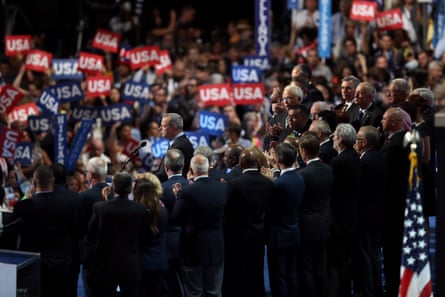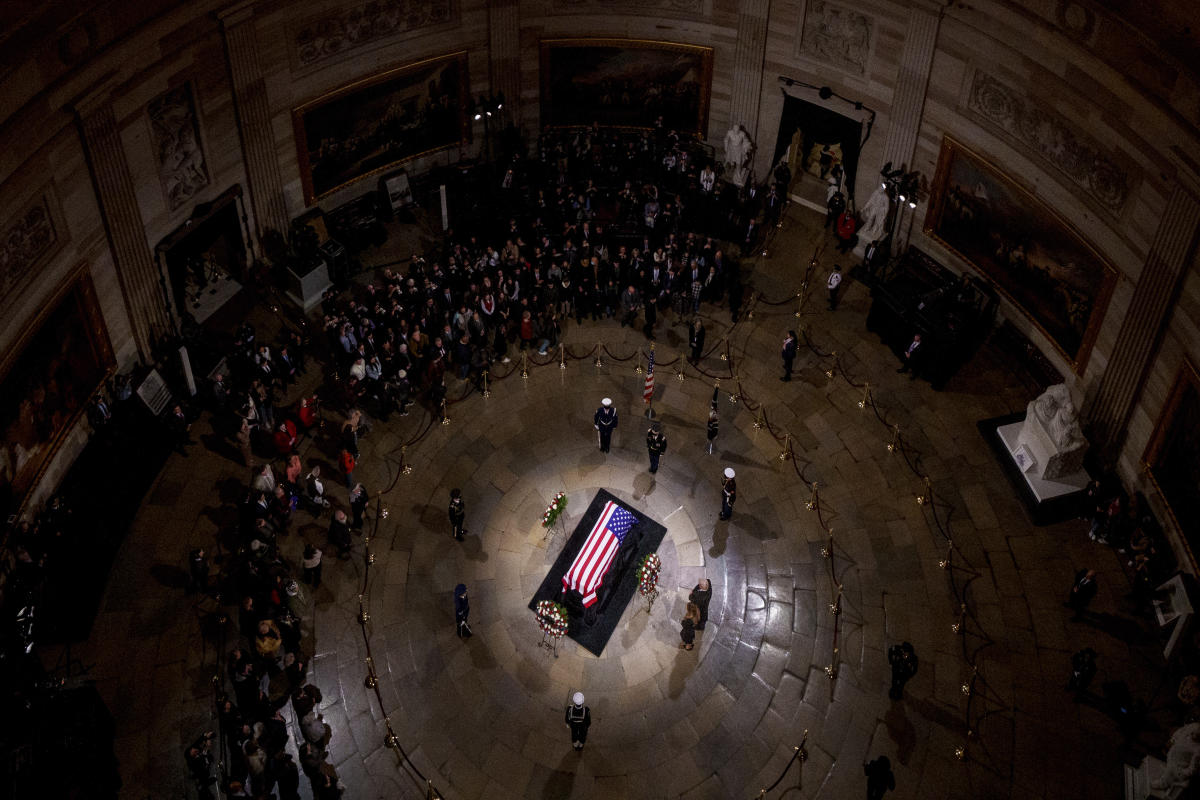In defending the militarist status quo, Democrats ceded the anti-war lane to Republicans. As they enter the political wilderness, it’s time to reckon with what they got so wrong

The most devastating appraisal of the 2024 Democratic national convention was delivered by the neoconservative doyen Bill Kristol: “Leon Panetta quoting Ronald Reagan! My kind of Democratic convention.” He meant it as praise.
Earlier in the day, rumors had been flying around Chicago about that evening’s possible surprise speakers. Who would it be? Beyoncé? Taylor Swift? Close! It turned out to be the 86-year-old former CIA director and secretary of defense who last served in government over a decade ago. In his speech, he cited Ronald Reagan to rail against “isolationism”, telling the assembled crowd: “Our warriors need a tough, cool-headed commander-in-chief to defend our democracy from tyrants and terrorists,” and declaring that Kamala Harris would be that leader.
Trotting out an ageing national security mandarin to reminisce about the “war on terror” was both tone deaf, and, like the Harris campaign in general, seemed like a huge misread of what voters wanted from prospective commanders-in-chief in 2024.
As I watched Panetta walk out on to the stage, I was reminded of the 2016 Democratic convention, where Gen John Allen, who had headed US efforts in Afghanistan and later against Isis, was the featured national security validator. Apparently under orders to terrify everyone, Allen delivered a blistering speech about the US as the “indispensable and transformational power in the world” and assured the crowd that Hillary Clinton would use that power to defeat “the forces of chaos and darkness”.

Like Clinton, Harris this year seemed far more interested in boasting about the US’s “lethal” military and campaigning alongside the torture advocate Liz Cheney (while also touting the endorsement of her father, the “war on terror” architect Dick Cheney) than in articulating a vision of peace and stability.
Meanwhile, in the last few weeks before the election, the Trump campaign noticeably leaned into an anti-war message, with JD Vance making the rounds hailing the now president-elect as a “candidate of peace”. A brief review of Trump’s first administration should make clear how ridiculous such a claim was, as he brought the US to the brink of wars with North Korea and Iran, spurned efforts by Congress to reassert authority over military action, and arguably helped set the stage for the wars in Ukraine and Gaza. His recent suggestion that the US could use force to seize the Panama Canal and Greenland should put permanently to bed the idea that he is “anti-war” or “anti-imperialist” in any sense.
But it was even more baffling that Democrats had left the anti-war lane wide open for him by leaning into a tired, curdled militarism as a substitute for an actual foreign policy vision. In foreign policy as elsewhere, Democrats positioned themselves as defenders of a set of ideas and assumptions that most Americans no longer trust. As Trump takes office and Democrats prepare to enter the political wilderness, we need to reckon with how they got this so wrong.
When Joe Biden took office in 2021, I never imagined I would write this, but by the end of his presidency he will have done more damage to the so-called “rules-based order” than Trump did. Fifteen months and counting of support for Israel’s horrific assault on Gaza has violated virtually every international norm on the protections of civilians in war and left America’s moral credibility in tatters. Biden showed that international law is little more than a cudgel to be used against our enemies while being treated as optional for our friends.

Because Trump is a foreign policy heretic, he could be dismissed as an outlier. It’s precisely because Biden is one of the order’s loudest exponents, not just a member of the church but one of its high priests, that he could more effectively expose its hollowness and hypocrisy, and the utter moral bankruptcy of a Washington foreign policy elite that is just fine with both.
In his 2020 election victory speech, Biden proclaimed: “I believe at our best America is a beacon for the globe. And we lead not by the example of our power, but by the power of our example.”
It’s a nice line, but Biden showed that he sees it as little more than that. The question now for Democrats is whether they can actually mean it, or if they even want to.
Why is this so hard?
It’s a cliche that Americans don’t vote on foreign policy issues. However, according to public opinion surveys by Chris Shell, a fellow with the American Statecraft Program at the Carnegie Endowment for International Peace, foreign policy played a relatively prominent role in the 2024 election – the climate crisis and immigration registered at the top of voters’ foreign policy concerns, followed by the war in Gaza, the Russia-Ukraine war and US-China relations. Among undecided voters in the weeks leading up to the election, Harris scored higher than Trump on only one of those issues (the climate crisis).
However disingenuous, especially given his aggressive support for rightwing forces in Israel, Trump’s vows to end the two wars dominating headlines were part of a winning message. According to the New York Times: “The Trump campaign’s research found that up-for-grabs voters were about six times as likely as other battleground-state voters to be motivated by their views of Israel’s war in Gaza.” Trump made a play for these voters, promising to seek peace and attacking Democrats for campaigning with the “radical war hawk” Liz Cheney. Just as he did in 2016 when he criticized Hillary Clinton as “trigger happy”, he managed to get to the Democrats’ left on foreign policy.
Democrats have no excuse for being surprised by this. Americans have voted for the less interventionist candidate of the two major parties in every presidential election since the end of the cold war (in the one exception, the post-9/11 election of 2004, John “reporting for duty” Kerry didn’t offer much of an alternative). George W Bush himself originally campaigned in 2000 on a “humbler” foreign policy.
Barack Obama ran and won by opposing not just the Iraq war, but warmongering itself. His memorable line in a January 2008 primary debate – “I don’t want to just end the war. I want to end the mindset that got us into war in the first place” – wasn’t just a critique of a policy, but of the entire militarist, interventionist foreign policy priesthood, which would later be termed “the Blob” by Obama’s speechwriter and adviser Ben Rhodes.

It was essentially an anti-system argument against an establishment that, for various reasons – political, ideological and economic – had internalized a set of beliefs about the transformative capacity of American military power and the inherent justice of using that power wherever and whenever. Championed to varying degrees by both parties during the cold war, that set of beliefs in many ways drove the global order for decades, and offered few incentives for leaders to propose alternatives. The Iraq catastrophe changed that equation.
However inspiring it was in the moment, Obama’s argument didn’t augur a durable change in how Democrats approached foreign policy. As was often the case with him, transformative rhetoric cloaked more modest policy aims (just ask any of the millions of families who lost homes after Obama failed to provide promised mortgage debt relief). After his efforts to close the Guantánamo Bay prison camp and put the 9/11 plotters on trial in New York were rebuffed, he seemed to quickly back off any broader foreign policy rethink. His efforts to change the foreign policy mindset were hampered not only by a recalcitrant security bureaucracy (a problem Trump also faced) and his own cautious instincts, but also by the fact that he brought into his administration two people who very much embodied that old way of thinking about foreign policy: Hillary Clinton and Joe Biden.

While bringing Clinton and Biden on board may have made shrewd short-term political sense, in the longer term it enabled both of them to populate the administration’s key foreign policy positions with their own proteges, ultimately ensuring that the commanding heights of Democratic foreign policy making remained firmly under control of the old establishment thinking. As a result, Democrats lost a critical opportunity to develop a genuinely new, fit-for-era foreign policy at a time when Americans were tired of failed adventurism overseas and looking for a genuinely different approach.
Ultimately, despite his hyper-cautiousness and his own party leadership’s obstinacy, Obama made a few significant foreign policy moves that challenged elite consensus – among the most important being the Iran nuclear deal and ending the Cuba embargo, both later reversed by Trump and then abandoned by Biden.
Among his most consequential decisions, however, was not to seek accountability for multiple alleged crimes committed by the Bush administration during the “war on terror”, including torture. Couched in an air of seeking reconciliation after all that nasty business, Obama’s declaration that we must “look forward not backward” was in fact a politically cowardly decision that, as with his bailing out of the big banks after the 2008 financial crisis while millions of Americans lost their homes, made clear once again that a shared belief in elite impunity is Washington’s only truly enduring bipartisan consensus. You can’t tout Dick Cheney’s endorsement and then complain about Trump’s ability to dodge accountability.
An alternative
In 2016, as Trump began his takeover of the Republican party, Bernie Sanders also offered Democrats an alternative. While his primary campaign initially focused almost exclusively on domestic policy, he soon began keying in on foreign policy issues, an area of perceived strength for the former secretary of state Hillary Clinton. It didn’t hurt that in contrast to Clinton and most of the other voices who tended to dominate the Washington foreign policy conversation, Sanders had a record of being correct.
From his prescient opposition to the Iraq war and early criticism of neoliberal economic theology, to his vocal position on Palestinian rights and his memorable claim that “I am proud to say that Henry Kissinger is not my friend,” he offered a critical foreign policy perspective that was integrated into a broader critique of a system that a sizable number of Americans felt was not delivering for them. As he continues to see it, domestic economic policies that benefit the wealthy few while producing economic precarity for the many are part of the same problem as foreign policies that benefit defense contractors while continually stoking conflict. But it was more than a critique. It was an affirmative vision of an America actively promoting peace.

Sanders’ strong showing in the 2016 primary gained progressives a seat at the policy table, but it wasn’t until 2020 (in which campaign I served as Sanders’ foreign policy adviser) that the establishment was forced to truly reckon with a movement that had grown substantially in the intervening four years. The Biden team wisely chose to engage with the left flank of the party on a range of issues, including foreign policy, producing a 2020 platform that was the most progressive in the party’s history.
Once in office, though, progressives learned a hard lesson: we had developed the ability to secure foreign policy commitments, but still lacked the power to enforce them. Upon taking office, Biden followed through on a few key promises, particularly on Afghanistan and scaling back US support for the Saudi offensive against Yemen, but soon reverted to a foreign policy defined by nostalgia for the post-cold war unipolar moment.
While Biden certainly deserves credit for ending the Afghanistan war, he seemed to think that withdrawing from Afghanistan fulfilled his promise to end the forever wars, as if the “war on terror” was just one war, instead of the omnipresent security state-run, emergency law-authorized global counterinsurgency campaign that the US is still waging around the world to this day. Even Biden’s positive early moves on Yemen were muddied by his decision to end the provision of only “offensive” weapons to the Saudis – a distinction his administration would later admit was false – foreshadowing his coming embrace of a regime he had previously promised to make a “pariah”.
Because there was no primary and therefore no way for critical voices to engage with the platform process, the 2024 platform’s foreign policy section was a dog’s breakfast of hawkish Mad Libs cranked out behind closed doors by longtime party functionaries. “The foreign policy section of the party’s 2024 platform largely reads as if the 2020 version never existed,” wrote the New Republic’s Blaise Malley. “The party, it seems, is proudly hawkish once again.”
While it was written before Biden withdrew from the presidential race, the platform unfortunately still proved fitting for a Harris campaign more interested in appealing to an imagined constituency of moderate Republicans who cared about the endorsements of Bill Kristol and Liz Cheney.
What should Democrats do?
The political scientist Daniel Drezner recently wrote that with the re-election of Trump, the era of American exceptionalism has ended: “Under Trump, US foreign policy will cease promoting long-standing American ideals. That, combined with an expected surge of corrupt foreign policy practices, will leave the United States looking like a garden-variety great power.”
But America has always applied its ideals selectively, to put it kindly.
One way of understanding American exceptionalism, at least in its current form, is as an affirmation of faith that the US is always on the side of good, that while the US may make mistakes, it always has good intentions. American exceptionalism allows a president to spout lines about “the power of our example” while backing war crimes and welcoming those accused of them to the White House. American exceptionalism is a way of not really having to look at policies and the outcomes they produce to ask if they’re working. One upside of Trump, and I use that term advisedly, is that he’s made it impossible not to look.

The slow death of this kind of American exceptionalism has been the work of multiple administrations. Trump is just here to bury the corpse. But if they ever take back the levers of power, a lot of Democrats will be tempted to try to dig it up and try to shock it back to life.
We should leave it in the ground.
Even if the Democratic party undergoes a genuine internal reckoning for its latest failure, the temptation will be to focus on domestic rather than foreign policy, areas where most Democrats tend to be more comfortable. But a better Democratic foreign policy is inseparable from a better Democratic domestic policy. An approach that reflects a commitment to the everyday needs of American workers will necessarily have a foreign policy component. The evidence shows that the party’s voters, and Americans in general, are eager for that conversation. At the very least, Democrats shouldn’t simply cede the ground to Republicans as it did in 2024.
It’s time for Democrats to offer Americans a new and affirmative vision of US foreign policy, one that boldly and unashamedly embraces global peacemaking as an essential component of our own security and prosperity. One that insists that keeping Americans safe does not require spending more on defense than the next 10 countries combined.
Our leaders should be clear about the genuine security threats that our country faces, but decide, at long last, to stop being drawn into dumb bidding wars about being “tougher on Russia/terrorism/China/whatever” – a framing designed to sustain the hawkish status quo. They should broaden the national security conversation to include the challenge of domestic and global inequality and the grievances it powers. They should articulate not just a domestic but a global pro-worker agenda – in addition to a global corporate minimum tax, a global minimum wage, for example. Make clear that a foreign policy fit for this era doesn’t pit the security and prosperity of Americans against workers in other countries but recognizes that our security and prosperity are bound together.
All of this will of course require confronting the various defense, business and foreign lobbies that distort and constrain our policy discussions, which is why a strong anti-corruption plank is essential for any such platform.
A key speech in the 2024 election cycle was JD Vance’s at the Republican national convention, which laid out the party’s roadmap for capturing a durable working-class majority. Advertised as a foreign policy address, it was really all about how US elites had failed the country and offered a blueprint for how the Republican party was going to capture the working class. Playing up his family roots in a small Ohio town – “a place that had been cast aside and forgotten by America’s ruling class in Washington” – Vance attacked Biden for his past support of the North American Free Trade Agreement, for China’s entry into the World Trade Organization, and for “the disastrous invasion of Iraq”, in which Vance served.
“At each step of the way, in small towns like mine in Ohio, or nextdoor in Pennsylvania or Michigan, in other states across our country, jobs were sent overseas, and our children were sent to war,” Vance said. This year’s Democratic ticket failed to provide a sufficient response. Instead of responding to the right’s tech oligarch-funded faux-populism by offering a genuine alternative and attacking the real sources of our country’s insecurity, they leaned into a defense of a militarist status quo that most Americans rightly recognize as broken. They must not make that mistake again.

 German (DE)
German (DE)  English (US)
English (US)  Spanish (ES)
Spanish (ES)  French (FR)
French (FR)  Hindi (IN)
Hindi (IN)  Italian (IT)
Italian (IT)  Russian (RU)
Russian (RU)  9 hours ago
9 hours ago























Comments